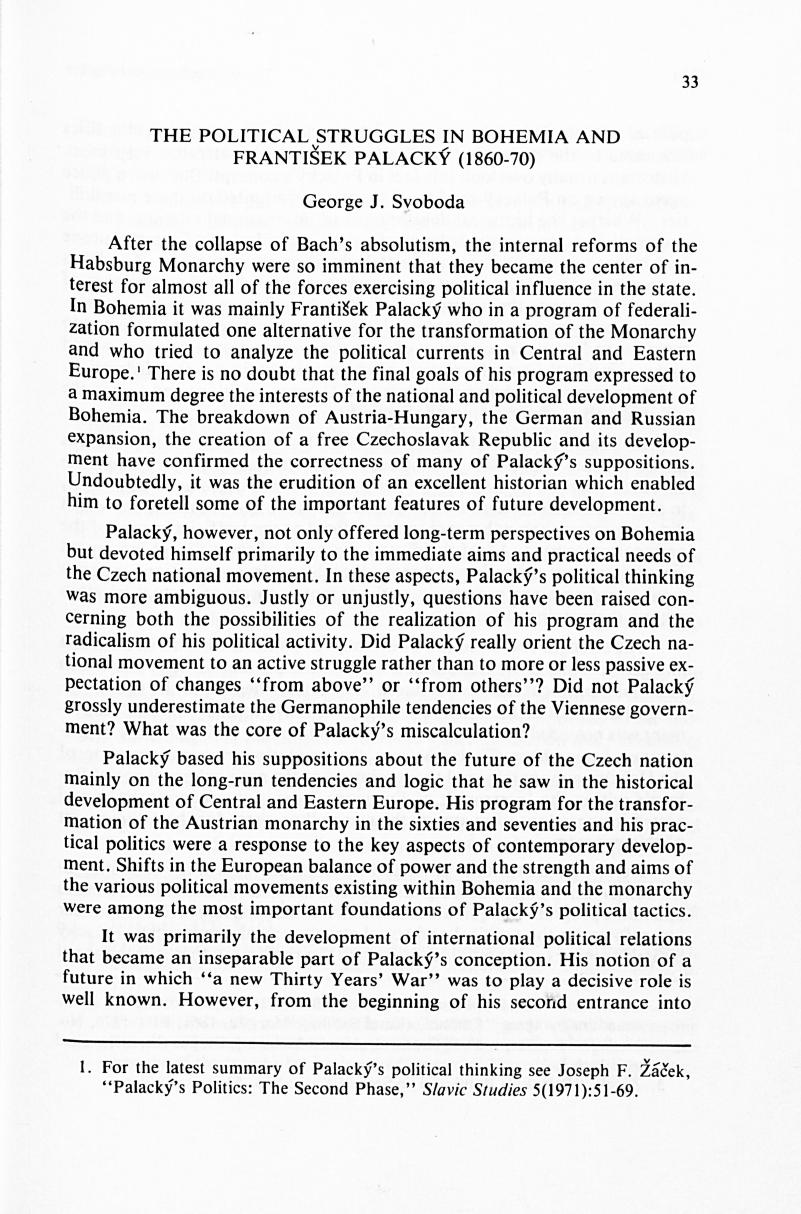No CrossRef data available.
Published online by Cambridge University Press: 20 November 2018

1. For the latest summary of Palacký‘s political thinking see Joseph F. Žáček, “Palacký‘s Politics: The Second Phase,” Slavic Studies 5(1971):51-69.CrossRefGoogle Scholar
2. Memorandum by a police agent, Feb. 25, 1853, PPT 1853, No. 90, and Memorandum by agent “Roman” (Karel Sabina), Mar. 22, 1861, PPT 1876, No. 18, Státní ústřední archiv [The Central State Archives], Prague (hereafter cited as S.Ú.A.).Google Scholar
3. Žáček, “Palacký's Politics: The Second Phase,” p. 53.Google Scholar
4. František Palacký, “Idea státu rakouského”, Radhošť, Sbírka spisů drobných (Prague: 1873), 3:163.Google Scholar
5. Friedrich Engel-Janosi, Oesterreich und der Vatikan, 1846-1918 (Graz, Vienna, Cologne: 1958), 1: 144-197; Georg Franz, Kulturkampf (Munich: 1954), p. 126.Google Scholar
6. See, for instance, James MacCaffrey, History of the Catholic Church in the Nineteenth Century (1789-1908) (St. Louis: 1910), pp. 329-30. It is interesting that the effort to win the Slavic priesthood for the policy of the government was one of the reasons for issuing the Concordat. This effort met with no success.Google Scholar
7. The description of the movement is based upon records of the Prague Police Department, May 12, 1868, S.Ú.A., Prague, PPT 1868, No. 29.Google Scholar
8. During the seventies the representatives of the Catholic church in Bohemia, including most the of Prague Jesuits, changed their point of view toward the political problems of Bohemia. Above all, they took a forward-looking and prudent attitude toward social problems and demanded substantial improvement of the workers' life-conditions. Father Kožený, one of the representatives of this movement among the Jesuits, explained the trend in 1880 by saying that the blind social policy and the rejection of the just requests of the poor would lead to the victory of socialism and even communism, and that no world power would be able to defeat these currents in Bohemia. The new church policy was formulated in Prague chiefly by the Jesuits of the Saint Ignatz Monastery and by the members of the Redemptorists' order. See the account of the vice-regent of Bohemia, July 29, 1880, S.Ú.A., Prague, PM 1871-1880, 8/1/15/1.Google Scholar
9. Jan Havránek, “Česká politika, konzervatívní aristokraté a uspořádání poměrů v habsburské říši v letech 1860-1867,” Sborník historický, 17 (1970): 67-95.Google Scholar